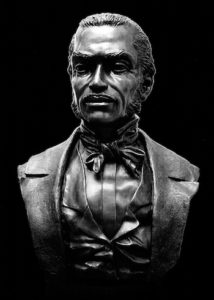
Frank McWorter, bust
*This date in 1777 is celebrated as the birth date of Free Frank McWorter. He was a Black slave, abolitionist, and businessman who bought his freedom.
Frank McWorter was born into slavery in South Carolina to Juda, a Black West African woman abducted into slavery and transported to the colony. His father was her white master, George McWhorter, a Scots-Irish planter. According to family tradition, Juda convinced McWhorter to allow his mixed-race son to live. In 1795, George McWhorter moved to Pulaski County, Kentucky, and took young Frank to build and manage his holdings there. Frank tended the farm, but McWhorter also leased him to work for neighbors. Frank learned business skills from being hired and earning more money for his master's. After McWhorter moved to Tennessee, he continued having Frank manage his Kentucky farm.
1799, Frank married Lucy, an enslaved Black woman on a neighboring plantation. They had thirteen children born into slavery, of which four, Juda, Frank, Sally, and Solomon, survived. Frank used his savings to create a saltpeter (potassium nitrate) production operation, for which there was considerable demand during the War of 1812—by 1817, Frank had earned enough money to buy Lucy from her master for $800. She was pregnant then with their son Squire, and he was (later) freeborn. Two years after that, in 1819, Frank bought his freedom at the same price. He then called himself Free Frank, which served public notice that he was legally free. (It was not uncommon for free Blacks to be kidnapped and enslaved.)
In 1829, Freed Frank traded his saltpeter plant for the freedom of his son Frank, who had fled to Canada and was a fugitive. (This allowed his son to return to the United States as a free man.) By this time, he and Lucy also had three surviving freeborn children: Squire, Commodore, and Lucy Ann. In 1830, Freed Frank, Lucy, and their four free children moved to Pike County, Illinois. By the second year, they started farming.
In 1836, he filed a plan to create the village of New Philadelphia on 80 acres, which he had purchased from the federal government for $100. The townsite, divided into 144 lots, was registered with government authorities in 1836. McWorter established residence in New Philadelphia with his family and sold other lots to new residents. Both Blacks and whites settled there and supported an integrated school. It was the crossroads of an agricultural community and, when founded, proposed as being on the route of a planned Illinois-Michigan canal (which was never built.)
In 1837, he petitioned the Illinois legislature (as was required) to officially take the surname McWorter. That same year, the legislation was passed to "make 'Frank McWorter' his legal name. "This technicality enabled him to have certain rights normally reserved for white men in Illinois. He could bring lawsuits to court and legally marry his wife of over 40 years. But he still could not vote." He was the first Black man in the United States to incorporate a municipality. For years, he served as mayor of New Philadelphia, which was soon settled by all races.
McWorter lived most of his life in western Illinois, with intervals in Kentucky before the American Civil War to buy freedom for his three grown children and grandchildren left in Kentucky. For instance, in 1835, he returned and purchased the freedom of his son Solomon. On each trip, he risked capture by unscrupulous slave traders despite his legally free status. Frank McWorter died on September 7, 1854; by then, he had bought the freedom of eight more of his relatives.
Through his work, he gained freedom for 16 members of his family. His heirs used his inheritance to free seven more relatives. In 1869, the first railroad was built through Pike County, bypassing New Philadelphia to the north for Baylis, which had a train station. Businesses moved there for better access. The population of New Philadelphia rapidly declined. By the end of the nineteenth century, some townsites had reverted to farmland for cultivation, but other areas were inhabited through the 1920s. McWorter's gravesite, located near Barry, Illinois, is listed on the National Register of Historic Places. A portion of I-72 in Pike County was designated the Frank McWorter Memorial Highway.